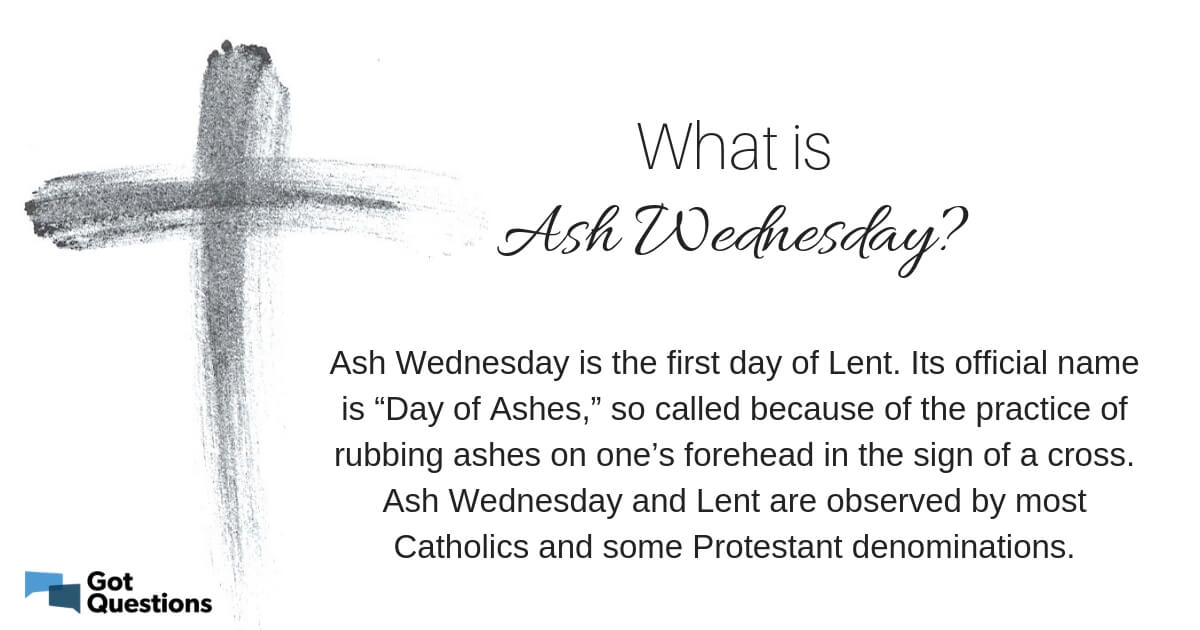What Is Ash Wednesday? Guide for Christians Celebrating
Each year, Ash Wednesday marks the beginning of Lent. In 2023, Ash Wednesday will be February 22nd. Ash Wednesday focuses the Christian’s heart on repentance and prayer, usually through personal and communal confession.
Each year, Ash Wednesday marks the beginning of Lent and is always 46 days before Easter Sunday. Lent is a 40-day season (not counting Sundays) marked by repentance, fasting, reflection, and ultimately celebration. The 40-day period represents Christ’s time of temptation in the wilderness, where he fasted and where Satan tempted him. Lent asks believers to set aside a time each year for similar fasting, marking an intentional season of focus on Christ’s life, ministry, sacrifice, and resurrection.
Table of Contents
- Who Celebrates Ash Wednesday?
- What is Ash Wednesday, and What Happens?
- Source and Meaning of the Ashes Used
- When is Ash Wednesday in 2023?
- The History of Lent and Ash Wednesday
- What Are You Not Allowed to Eat on Ash Wednesday?
- Is Ash Wednesday only for Catholics or Protestants?
- Verses to Reflect on for Ash Wednesday
- A Prayer for Ash Wednesday
- Sources
Who Celebrates Ash Wednesday?
Have you ever noticed, usually in February or March, a lot of people walk around with an ash cross on their foreheads once a year? You probably knew it had something to do with Lent, but you weren’t sure why the ash cross was significant.
Or maybe, you grew up in a Catholic or Protestant church that held Ash Wednesday services each year, so you’re already familiar with the service but aren’t too sure about the history of Ash Wednesday and Lent and what they have to do with the Christian faith. Read on if you want to learn more about this important day in the liturgical calendar and why so many celebrate Ash Wednesday and Lent!
Often called the Day of Ashes, Ash Wednesday starts Lent by focusing the Christian’s heart on repentance and prayer, usually through personal and communal confession. This happens during a unique Ash Wednesday service.
What Happens on Ash Wednesday?

Photo credit:©Unsplash/Ahna Ziegler
During Mass (for Catholics) or worship service (for Protestants), the priest or pastor will usually share a penitential and reflective sermon. The mood is solemn – many services will have long periods of silence and worshipers will often leave the service in silence.
Usually, there is a responsive passage of Scripture, usually centered around confession, read aloud about the leader and congregation. Attendees will experience communal confession and moments where they are prompted to confess sins silently and pray.
After all of this, the congregation will be invited to receive the ashes on their foreheads. Usually, the priest or pastor will dip his finger into the ashes, spread them in a cross pattern on the forehead, and say, “From dust you came and to dust you will return.”
Source and Meaning of the Ashes
In many congregations, the ashes are prepared by burning palm branches from the previous Palm Sunday. On Palm Sunday, churches bless and hand out palm branches to attendees, referencing the Gospels’ account of Jesus’ triumphal entry into Jerusalem, when onlookers lay palm branches on his path.
The ashes of this holiday symbolize two main things: death and repentance. “Ashes are equivalent to dust, and human flesh is composed of dust or clay (Genesis 2:7), and when a human corpse decomposes, it returns to dust or ash.”
“When we come forward to receive ashes on Ash Wednesday, we are saying that we are sorry for our sins and that we want to use the season of Lent to correct our faults, purify our hearts, control our desires and grow in holiness so we will be prepared to celebrate Easter with great joy” (The CatholicSpirit.com).
With this focus on our own mortality and sinfulness, Christians can enter into the Lent season solemnly while also looking forward in greater anticipation and joy to the message of Easter and Christ’s ultimate victory over sin and death.
When Is Ash Wednesday in 2023?
Here are the most significant dates of Lent and when they will occur in 2023:
| Important Dates of Lent | Brief Overview of Significance | 2023 Date |
| Ash Wednesday | The beginning of Lent, a day of reflection and repentance from sin | February 22, 2023 |
| Palm Sunday | Celebrates Jesus’s triumphant entry into Jerusalem | April 2, 2023 |
| Holy Week | The week leading up to Easter | April 2 – April 8, 2023 |
| Maundy Thursday | Commemorates the foot washing and Last Supper of Jesus Christ with the Apostles | April 6, 2023 |
| Good Friday | Commemorates the crucifixion of Jesus and his death at Calvary | April 7, 2023 |
| Easter Sunday | Celebrates the resurrection of Jesus from the dead and His victory over sin and death | April 9, 2023 |
Future Ash Wednesday Dates:
February 14, 2024
March 5, 2025
February 18, 2026
February 10, 2027
The History of Lent and Ash Wednesday
The history and beginnings of Lent aren’t clear. According to Britannica.com, Lent has likely been observed: “since apostolic times, though the practice was not formalized until the First Council of Nicaea in 325 CE.” Christian scholars note that Lent became more regularized after the legalization of Christianity in A.D. 313. St. Irenaeus, Pope St. Victor I, and St. Athanasius all seem to have written about Lent during their ministries. Most agree that “by the end of the fourth century, the 40-day period of Easter preparation known as Lent existed, and that prayer and fasting constituted its primary spiritual exercises.”
Is there Fasting on Ash Wednesday?
Regarding the exact rules and practices of Lent, those have changed over the years. “In the early centuries, fasting rules were strict, as they still are in Eastern churches,” notes Britannica.com. “One meal a day was allowed in the evening, and meat, fish, eggs, and butter were forbidden. The Eastern church also restricts the use of wine, oil, and dairy products. In the West, these fasting rules have gradually been relaxed. The strict law of fasting among Roman Catholics was dispensed with during World War II, and only Ash Wednesday and Good Friday are now kept as Lenten fast days.”
Is Ash Wednesday only for Catholics or Protestants?
Catholic, Orthodox, and many (but not all) Protestants appreciate and observe Lent. Though Lent is not named or observed in the Bible, as Christianity Today notes, “the path of Lent—prayer, fasting, and generosity over a period of time—is heavily emphasized by the authors of and characters in the Bible, including Jesus. The Bible commands a lifestyle of worship and devotion that looks considerably like Lent. Therefore, while the word is absent in the Bible, the reality of Lent is woven throughout the whole of Scripture, as we have discovered.”
In his Gospel Coalition article Evangelicals Embracing (and Rejecting) Lent, Trevin Wax gives us an important reminder regardless of whether we personally observe Lent:
“I hardly think the church is suffering from too much fasting,” Wax says. “But I do think the church is suffering from too much self-righteousness (and I include myself in this indictment). Lent – being either for or against – can become a way of climbing up on to the pedestal.”
He goes on to say, “What is more important than the practices we take on is the heart attitude behind them. If there’s anything we should give up this time of year, it’s our sense of superiority either to those outside the church or those inside the church who do things differently than we do.”

Photo credit: ©Pixabay/GiniGeo Photography
Bible Verses for Ash Wednesday
If you’d like to start thinking through and observing Lent and Ash Wednesday, here are a few verses specific to Ash Wednesday to meditate and reflect on, and then a prayer you can pray to observe the day.
- Our Creation: Genesis 2:7 – Then the LORD God formed a man from the dust of the ground and breathed into his nostrils the breath of life, and the man became a living being.
- Our Curse: Genesis 3:19 – By the sweat of your brow you will eat your food until you return to the ground since from it you were taken; for dust you are and to dust you will return.”
- Our Cry of Repentance: Psalm 51:7- 10 – Cleanse me with hyssop, and I will be clean; wash me, and I will be whiter than snow. Let me hear joy and gladness; let the bones you have crushed rejoice. Hide your face from my sins and blot out all my iniquity. Create in me a pure heart, O God, and renew a steadfast spirit within me.
A Prayer for Ash Wednesday:
Lord, Holy One, have mercy on us. We confess our sins to you. We have fallen short of your glory and without your mercy and grace, we would be dust. We repent now. Lord, as we enter this Lenten season, be near us. Help us, by your Holy Spirit, to feel the proper conviction and repentance for our sin. Help us, by your Spirit, to have the strength to overcome the enemy.
Thank you, Lord, that Easter is coming! Death has no sting, no victory, because of Jesus! Glory and honor and praise to His name! Thank you for rescuing us. Help us keep the weight and the joy of this season in our hearts as we move through the next several weeks. Help us bear the good fruit of your Spirit.
Thank you that the ashes on our forehead do not symbolize our ultimate reality. From dust, we might have been formed, but our bodies, our spirits, ourselves, await beautiful redemption and the restoration of all things. Help us long and look forward to that day, and let it come quickly, Lord Jesus. Amen.
An Ash Wednesday Prayer for Remembrance and Reflection
In addition to receiving an ash cross on our forehead, services also have an Ash Wednesday prayer. Whether you, as a pastor, need ideas for the prayer, or you as a laity want to pray with your family before or after the Ash Wednesday service, we’ve included an example below.
Not all churches have a day or service dedicated to Ash Wednesday, but many denominations do recognize this day on the holy calendar of events for that year and prayer is an important part of the day. Ash Wednesday kicks off the start to Lent season, right after Shrove Tuesday. During this time of reflection, Christians will often fast and pray. This fasting might look like giving up meat, sweets, or technology. Others imitate Jesus during his 40 days in the desert and refrain from eating at all. The Ash Wednesday prayer is a beautiful start to the Lent season of reflection.
The somber Lent season not only reminds us of Jesus’ encounter with the devil in the desert and how Jesus resisted temptation (Matthew 4) but it leads up to Holy Week and the events of Good Friday and Easter Sunday. We wait in anticipation for both. Usually, in addition to receiving an ash cross on our forehead, services also have an Ash Wednesday prayer. Whether you, as a pastor, need ideas for the prayer, or you as a laity want to pray with your family before or after the Ash Wednesday service, we’ve included an example below. Most often Ash Wednesday prayers remind us that we are but dust, and to dust, we will return (Genesis 3:19). This holiday helps us to remember that we cannot earn our own salvation, but that God allows us to come into a relationship with him after he dies on the cross and resurrects. Let’s explore what this holiday means and how we can pray for a renewing of the mind during the Lent season.
Ash Wednesday Prayer
During this time of reflection and repentance, we may not know the right words to say when in the presence of a holy God who paid the penalty of our sins. We have a sample prayer below, but please feel free to deviate from it based on how the Spirit leads:
Heavenly Father, during this time of reflection I remember how you lived the life I ought to have lived. You showed us how to resist temptation during your time in the desert, and through the life you led here on earth. As this Lent season begins, remind me that I am but dust. I can do nothing without you. Help me to see the world through the eyes of those in the first Lent season, who awaited a Savior and awaited new life through you. Thank you for your sacrifice on the cross, and as I refrain from [fill in the blank, for what you choose to give up for Lent] help me to use that time I would spend on [fill in the blank item] to pray, reflect, and thank you. Amen.
Psalm 51 Prayer
Have mercy upon me, O God, According to Your lovingkindness; According to the multitude of Your tender mercies, Blot out my transgressions. 2 Wash me thoroughly from my iniquity, And cleanse me from my sin. 3 For I acknowledge my transgressions, And my sin is always before me. 4 Against You, You only, have I sinned, And done this evil in Your sight– That You may be found just when You speak, And blameless when You judge. 5 Behold, I was brought forth in iniquity, And in sin my mother conceived me. 6 Behold, You desire truth in the inward parts, And in the hidden part You will make me to know wisdom.
7 Purge me with hyssop, and I shall be clean; Wash me, and I shall be whiter than snow. 8 Make me hear joy and gladness, That the bones You have broken may rejoice. 9 Hide Your face from my sins, And blot out all my iniquities. 10 Create in me a clean heart, O God, And renew a steadfast spirit within me. 11 Do not cast me away from Your presence, And do not take Your Holy Spirit from me. 12 Restore to me the joy of Your salvation, And uphold me by Your generous Spirit. 13 Then I will teach transgressors Your ways, And sinners shall be converted to You.
14 Deliver me from the guilt of bloodshed, O God, The God of my salvation, And my tongue shall sing aloud of Your righteousness. 15 O Lord, open my lips, And my mouth shall show forth Your praise. 16 For You do not desire sacrifice, or else I would give it; You do not delight in burnt offering. 17 The sacrifices of God are a broken spirit, A broken and a contrite heart– These, O God, You will not despise.
A Prayer for Ash Wednesday Observation
Almighty and everlasting God, you hate nothing you have made and forgive the sins of all who are penitent: Create and make in us new and contrite hearts, that we, worthily lamenting our sins and acknowledging our wretchedness, may obtain of you, the God of all mercy, perfect remission and forgiveness; through Jesus Christ our Lord, who lives and reigns with you and the Holy Spirit, one God, for ever and ever. Amen.
Almighty God, you have created us out of the dust of the earth: Grant that these ashes may be to us a sign of our mortality and penitence, that we may remember that it is only by your gracious gift that we are given everlasting life; through Jesus Christ our Savior. Amen. (provided by the Book of Common Prayer)
What Happens on Ash Wednesday?
Most church services follow the same format for this holiday. Palm leaves from Palm Sunday celebrations the previous year service as the ashes that the clergy place upon the foreheads of the congregation.
When the pastor or another church official marks a person’s forehead with a cross, they often will say something along the lines of, “For you are dust, and to dust you shall return.”
The service will often read from a passage of Scripture either from Isaiah or Joel or some churches will read one of the Gospel accounts of when the devil tempted Jesus. Often the sermon or homily will contain some call to repentance and reflection, as is the motif of the Lent season.
Not all Christians participate in Ash Wednesday within their churches. Some do something similar within their homes, and some churches also offer “ashes to go.”
The Roman Catholic Church does not alone participate in any Ash Wednesday traditions. Many other denominations and Christians will either have an ash service at church or will do something on this day to commence the sobering Lent season.
When Is Ash Wednesday?
Ash Wednesday changes its date based on the calendar year. As you guessed by the name, it occurs on a Wednesday and always happens right after Mardi Gras (or “Fat Tuesday,” “Shrove Tuesday”).
In 2023, Ash Wednesday occurs on February 22nd.
If you are unsure when the holiday will occur during your calendar year, check your calendar to find out when Mardi Gras will happen. The day after Shrove Tuesday, Ash Wednesday follows. But churches often keep the congregation in the loop about holidays in the holy calendar, even if they do not have a specific service dedicated to it.
Now that we’ve established when the holiday happens let’s explore the biblical origins of this event.
Is Ash Wednesday in the Bible?
We can find many places in the Bible that have a major influence on Ash Wednesday. As mentioned before, the “to the dust you shall return” from Genesis 3:19 plays a big role. In Genesis 3, the first sin happened. Eve ate from the tree of knowledge, and Adam passively allowed her to do so. After this occurs, God reminds them that sin has a consequence: death. And this sin has passed on from generation to generation. Death follows us. But thankfully, God offers us a chance at a new life.
We can also point to many instances in Scripture where people would pour dust or ashes over their heads as a sign of mourning or repentance:
Revelation 18:19: “And they threw dust on their heads and were crying out, weeping and mourning, saying, ‘Woe, woe, the great city, in which all who had ships at sea became rich by her wealth, for in one hour she has been laid waste!’”
2 Samuel 1:2: “On the third day, behold, a man came out of the camp from Saul, with his clothes torn and dust on his head. And it came about when he came to David that he fell to the ground and prostrated himself.”
Joshua 7:6: “Then Joshua tore his clothes and fell to the earth on his face before the ark of the Lord until the evening, both he and the elders of Israel; and they put dust on their heads.”
Lamentations 2:10: “The elders of the daughter of Zion Sit on the ground, they are silent. They have thrown dust on their heads; They have girded themselves with sackcloth. The virgins of Jerusalem Have bowed their heads to the ground.”
We could go on, but ashes or dust on the head represents repentance. As Christians, we recognize that our sin had formed a chasm between ourselves and God, and we had no way of bridging that gap on our own.
Of course, as mentioned above, Jesus’ time in the desert also marks an important part of Ash Wednesday and the 40 days of Lent that follow. During his time in the wilderness, he refrained from eating for 40 days. The devil came to taunt him and tempt him on three separate occasions, but Jesus resists him every time.
We can also point to Ezekiel 9:4 as another verse that influenced this holiday. “Go throughout the city of Jerusalem and put a mark on the foreheads of those who grieve and lament over all the detestable things that are done in it.”
Doesn’t a mark on the forehead sound familiar?
We could continue to point out the many parallels between Scripture and Ash Wednesday. Although we don’t have records of the first Ash Wednesday observances until the 11th century, we can know that they pulled everything directly from Scripture. Many worship songs and hymns do this as well. source

